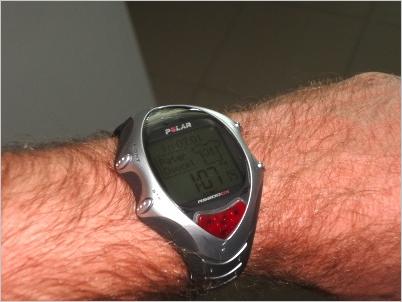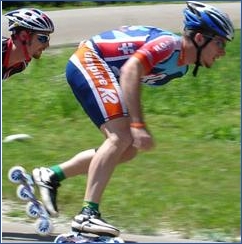This week's tip:
How to Spot Overtraining and What to Do About It
By Peter Doucet

Peter Doucet's heart rate monitor
You’ve trained hard, both on skates and off. You’ve done your interval training and speed work, and you’ve pumped iron at the gym several times a week.
You should be in the best shape of your life. But something’s wrong.
Despite all your hard work, it feels like you are going slower. And you’re legs are tired all the time.
Maybe it’s nothing. But more likely, you’re overtraining.
What is overtraining?
Overtraining is what you are doing when you push yourself beyond your body’s ability to adapt and recover. When you overtrain, two things happen: first, you get less benefit from your workouts; second, your performance takes a nose dive.
How do you know if you’re overtraining?
Here are the classic symptoms:
- Elevated heart rate
- Fatigue
- Persistent leg soreness, aches, and pains
- An increase in recovery time
- A compulsive need to train
- A rapid and ongoing slump in performance (diminished endurance, strength, speed)
- Insomnia
- Reduced readiness for competition and departure from usual tactics
- An increased frequency of colds, sore throats or headaches
- A decrease in training capacity and intensity
- Moodiness and irritability
- A loss of enthusiasm for training
- Decreased appetite
How a heart rate monitor can help
Overtraining puts stress on your body, causing your heart to pump faster than usual. You can spot this with the help of a heart rate monitor. Keep an eye on your heart rate for a few days after an intense workout. Normally, your heart rate should go quickly back to normal. But if you have been overtraining, it may take a couple days longer.
Another indication of overtraining is if, during an intense workout, your heart rate remains faster than usual.
Why do we do this to ourselves?
Basically, overtraining happens because we want to be the best we can. A few things that typically contribute to overtraining are:
- Insufficient rest and recuperation
- Training that is too frequent or too intense
- Too much enthusiasm: trying to accomplish too much too soon
- Too much racing with not enough time to recover
- Too much emphasis on one kind of training (e.g., interval training).
How to recover from overtraining
First, you’ve got to give yourself a break. You can do this by either cutting back or taking a complete break from your training.
Get fully rested, however long that takes. Then restart training but more wisely.
Whatever you were doing before wasn't working. Revise your program. Get a coach or personal trainer if need be.
It may be that you need to spend more time on your base conditioning. Skaters often neglect this step in their rush to plunge into high intensity workouts.
But don't fall into this trap. Without a base, high intensity training will burn you out.
Be patient. It can take as long as five months to build your base.
Start a training log
Training logs are powerful tools. They help you keep an eye on the big picture and identify problems, like overtraining.
And they're easy to maintain. Just spend a few minutes a day writing down what you did during your training sessions and how you feel. Note the intensity and duration of workouts, your weight and heart rate, and how you are sleeping and eating.
Don't neglect your diet and sleep. You need to eat and sleep well to recover from your workouts.
Finally, lighten up.
Sure, you want to do your best. But Rome wasn’t built in a day nor without the occassional break for a game of bocce ball.
Do some fun stuff aside from your serious training. Swim a few laps in the pool, join a volleyball league, go for a bike ride.
Having fun beats stress, which is another cause of overtraining.
 Peter Doucet is the 2010 National Roller Cup champion (men's open division) and the webmaster of Speed Skate World. A resident of Mississauga, Ontario, he has represented Canada in seven World Championships and at the 2007 Pan American Games in Brazil. He founded the Toronto International Inline Race Weekend and the RSO Speed Points Series. He is also a coach of the Toronto Inline Skating Club. His hobbies include writing and performing music, cycling, watching movies, going out with friends, and cooking.
Peter Doucet is the 2010 National Roller Cup champion (men's open division) and the webmaster of Speed Skate World. A resident of Mississauga, Ontario, he has represented Canada in seven World Championships and at the 2007 Pan American Games in Brazil. He founded the Toronto International Inline Race Weekend and the RSO Speed Points Series. He is also a coach of the Toronto Inline Skating Club. His hobbies include writing and performing music, cycling, watching movies, going out with friends, and cooking.